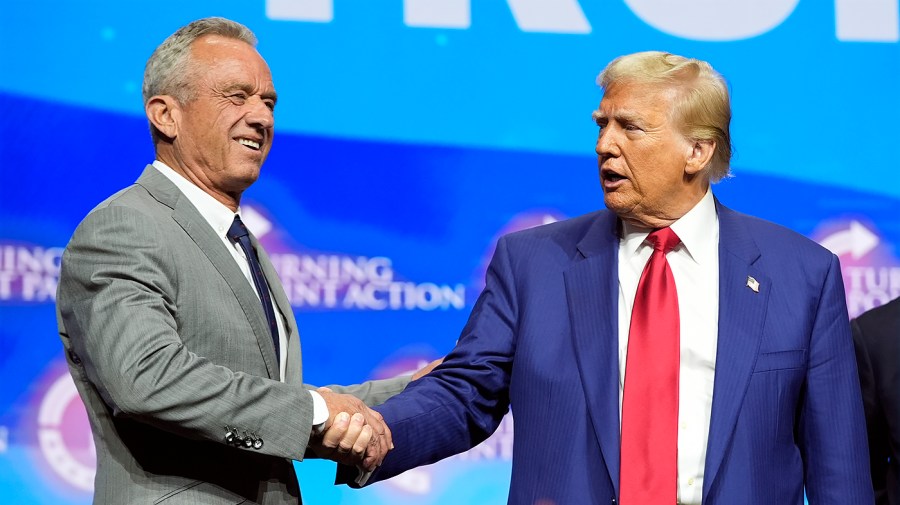[ad_1]

Robert F. Kennedy Jr.’s presence on the ballot in the swing states of Michigan and Wisconsin is raising concerns that he could inadvertently draw crucial votes from former President Trump.
Kennedy, an environmental lawyer and former independent candidate, this week formally asked the Supreme Court to scrub his name from the Badger State ballot, his last effort in an ongoing legal battle to remove himself from as many battleground ballots as possible in the final days of the presidential election.
It appears unlikely, however, that Kennedy will be successful in his quest, which could end up having an unintended negative effect on Trump and may even help Vice President Harris on the margins in two Midwestern states.
“RFK Jr.’s manipulation of the system to get on the ballot where it helps Trump and off the ballot where it hurts was unprecedented and undemocratic,” Adrienne Watson, an adviser to the Democratic National Committee, told The Hill on Friday.
“Ironically, in states like Michigan and Wisconsin, where state law doesn’t allow candidates to withdraw from the ballot, he will likely be taking more votes from Trump than Harris,” Watson said.
Before Kennedy agreed to drop his candidacy and become a surrogate for Trump, advisers close to both candidates devised a plan to get Kennedy off state ballots that could harm Trump’s chances against Harris. He didn’t bother trying to get off most ballots in blue states but worked to ensure that voters across the country would not be able to support him in true toss-ups.
As part of that negotiation, Kennedy, who has been enlisted by the Trump campaign to persuade independents to vote Republican, has repeatedly told his supporters not to waste their ballots on him.
“I don’t want you to vote for me,” he said to fans who showed up at a Trump rally in Walker, Mich., in late September, trialing the message that he has pushed for the past month.
Kennedy has since joined Trump at rallies and spoken at town halls on his behalf, abandoning the politics of his Democratic name and former party to go full-on MAGA and ensure that voters know he wants to reelect the former president.
Trump has embraced Kennedy’s migration into his circle. He recently appeared to confirm that the nephew of John F. Kennedy will be given some kind of position in his administration if the GOP nominee is elected to a second term in office.
“He’s going to be a part of it,” Trump said about Kennedy this week, discussing his potential reentrance to the White House. “Everybody likes Bobby.”
For all the good feelings in Trump’s orbit, there’s a lingering debate about what may happen if Kennedy ends up pulling support from Trump in the critical “blue wall” states he ultimately couldn’t get off of.
Kennedy has managed to remove his name from consideration in most of the states that will help determine who heads to Pennsylvania Avenue in two weeks, including Georgia, Arizona, North Carolina and Nevada.
He contested Wisconsin the strongest after state officials denied his attempt to remove his candidacy. Officials refused to make an exception to their requirement that allows only death as a valid reason to delete a candidate’s name.
Polling shows that Trump is ahead by a hair — 0.4 percentage points — in the state, according to the latest average by The Hill/Decision Desk HQ.
Kennedy’s strategy to wipe himself off all swing ballots is an indication that he believes his high name recognition and third-party posture could potentially cut into Trump’s slight lead.
“They couldn’t undo them all,” said one source close to Kennedy’s operation who is in touch with Trump surrogates. The “GOP has been investing big out there,” the source said about Wisconsin, hoping to counteract any fringe support that could add up.
“Those votes are unlikely to be decisive,” said Matt Bennett, co-founder of the center-left think tank Third Way who has helped lead the anti-third-party attack for Democrats this cycle.
“But in a race this close, every swing-state vote matters. So, if those who would vote for Trump in a two-way race pull the lever for Kennedy’s ghost ship of a campaign, Democrats will gladly take it,” he said.
In Michigan, there’s more optimism among Republicans and others sympathetic to the anti-Harris effort that the remaining third-party candidates will take votes from the Democratic nominee and deflate her prospects.
“I know Jill Stein and Cornel West are making a big play for dissatisfied Arab and Muslim voters in Michigan,” the pro-Kennedy source said.
After Kennedy bowed out of the presidential contest, Democrats have homed in on Stein, West and Chase Oliver, the Libertarian nominee, as possible political anomalies that could impact Harris. In Democrats’ view, Stein proved her “spoiler” bona fides in 2016 by sapping some votes from Hillary Clinton in Michigan and giving Trump a win.
Kennedy could have a similar effect in the only places where his candidacy endures, but with an even more unpredictable outcome.
“RFK’s spoiler role in this race has always been unclear. We just don’t know who is attracted to his particular brand of weird,” Bennett said.
“But since he’s gone all-in for Trump … he has somehow gotten even crazier,” Bennett added. “Democrats long ago ceded the lunatic lane to others, so the likeliest votes he collects are from folks who would otherwise support Trump or not vote.”
Democrats are indeed tailoring a small part of their closing pitch to address Kennedy as well as the current crop of candidates, but they have become less frantic about the third-party threat without showing up more broadly on ballots nationwide.
One former Democratic presidential candidate said they would be “pretty surprised” if Kennedy’s name in the two battlegrounds would matter much for either major party on Nov. 5.
“Both sides should worry less about third party candidates and worry more about having popular policies that people love,” the ex-candidate said.
[ad_2]
Source link

